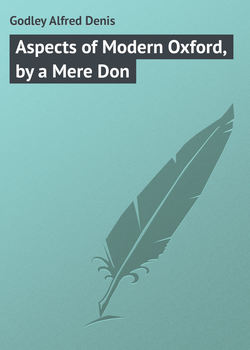Aspects of Modern Oxford, by a Mere Don

Реклама. ООО «ЛитРес», ИНН: 7719571260.
Оглавление
Godley Alfred Denis. Aspects of Modern Oxford, by a Mere Don
I-OF DONS AND COLLEGES
II-OF UNDERGRADUATES
III-OF SIGHTSEERS
IV-OF EXAMINATIONS
V-UNIVERSITY JOURNALISM
VI-THE UNIVERSITY AS SEEN FROM OUTSIDE
VII-DIARY OF A DON
VIII-THE UNIVERSITY AS A PLACE OF LEARNED LEISURE
Отрывок из книги
Whatever the theory of their founders, it is at no late period in the history of colleges that we begin to trace the development of the modern undergraduate. It was only natural that the 'gentle natures and studious habits' of a select band of learners should undergo some modification as college after college was founded, and comparative frivolity would from time to time obtain admission to the sacred precincts. The University became the resort of wealth and rank, as well as of mere intellect, and the gradual influx of commoners-still more, of 'gentlemen commoners'-once for all determined the character of colleges as places of serious and uninterrupted study. Probably the Civil War, bringing the Court to Oxford, was a potent factor in relaxation of the older academic discipline; deans or sub-wardens of the period doubtless finding some difficulty in adapting their rules to the requirements of undergraduates who might from time to time absent themselves from chapel or lecture in order to raid a Parliamentary outpost.
But perhaps the most instructive picture of the seventeenth-century undergraduate is to be found in the account-book of one Wilding, of Wadham (published by the Oxford Historical Society), apparently a reading man and a scholar of his college, destined for Holy Orders. The number of his books (he gives a list of them) shows him to have been something of a student, while repeated entries of large sums paid for 'Wiggs' (on one occasion as much as 14*s*-more than his 'Battles' for the quarter!) would seem to suggest something of the habits of the 'gay young sparks' alluded to by Hearne in the next century. On the whole, Master Wilding appears to have been a virtuous and studious young gentleman. Now and then the natural man asserts himself, and he treats his friends to wine or 'coffea,' or even makes an excursion to 'Abbington' (4*s.*!). Towards the end of his career a 'gaudy' costs 2*s.* 6*d.*, after which comes the too-suggestive entry, 'For a purge, 1*s.*' Then comes the close: outstanding bills are paid to the alarming extent of 7*s.* 8*d.*; a 'wigg,' which originally cost 14*s.*, is disposed of at a ruinous reduction for 6*s.*-the prudent man does not give it away to his scout-and J. Wilding, B.A., e. Coll., Wadh., retires to his country parsonage-having first invested sixpence in a sermon. Evidently a person of methodical habits and punctual payments; that had two wigs, and everything handsome about him; and that probably grumbled quite as much at the 10*s.* fee for his tutor as his modern successor does at his 8*l.* 6*s.* 8*d.* But, on the whole, collegiate and university fees seem to have been small.
.....
Possibly the Oxford of a bygone generation may have furnished models for these brilliantly coloured pictures; or, as is more probable, they were created by the licence of fiction. At any rate the 'man' of modern times is a far less picturesque person-unpicturesque even to the verge of becoming ordinary. He is seldom eccentric or outré in externals. His manners are such as he has learnt at school, and his customs those of the world he lives in. His dress would excite no remark in Piccadilly. The gorgeous waistcoats of Leech's pencil and Calverley's 'crurum non enarrabile tegmen' belong to ancient history. He is, on the whole, inexpensive in his habits, as it is now the fashion to be poor; he no longer orders in a tailor's whole shop, and his clubs are generally managed with economy and prudence. If, however, the undergraduate occasionally displays the virtues of maturer age, there are certain indications that he is less of a grown-up person than he was in the brave days of old. It takes him a long time to forget his school-days. Only exceptionally untrammelled spirits regard independent reading as more important than the ministrations of their tutor. Pass-men have been known to speak of their work for the schools as 'lessons,' and, in their first term, to call the head of the College the head-master. Naturally, too, school-life has imbued both Pass and Class men with an enduring passion for games-probably rather a good thing in itself, although inadequate as the be-all and end-all of youthful energy. Even those who do not play them can talk about them. Cricket and football are always as prolific a topic as the weather, and nearly as interesting, as many a perfunctory 'Fresher's breakfast' can testify.
The undergraduate, in these as in other things, is like the young of his species, with whom, after all, he has a good deal in common. Take, in short, the ordinary provincial young man; add a dash of the schoolboy and just a touch of the Bursch, and you have what Mr. Hardy calls the 'Normal Undergraduate.'
.....